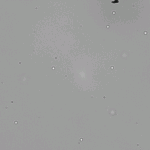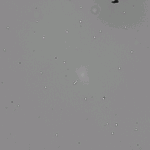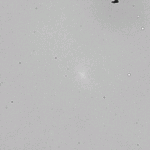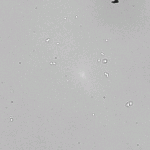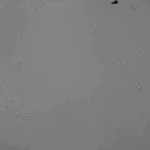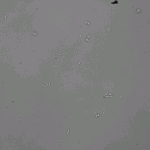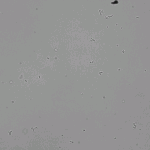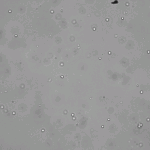Today I need to buy microspheres. In the first experiments we used spheres with a diameter of 0.5um (or 500nm), and over time we eventually switched to using 1.0um beads. The reason is because: 1) big beads are easier to see if they are tethered or not, 2) you get better tweezer forces with the larger beads, and 3) the big beads clump less. The only drawback to using the larger beads is that there is a lot of repulsion between the beads and our glass surface so our DNA tethers need to be longer. I invented the 4kb pALS anchor to solve this very problem.
Here are some pictures of the different sized beads in the tethering environment:
And for completeness here are some old notebook entries regarding those pictures:
- DNA Tethering Experiments: 2/12, 2/15, 2/16
- Entry about the Small/Big bead sample
- Entry that talks about sonicating the beads
- Useful Protocols: Preparing the samples, preparing the beads
And here is a video that shows the tethering results of the DNA experiments listed above:
We want beads that are coated in streptavidin (or some form of avidin) because this molecule creates a very strong bond with biotin which is attached to our DNA for stretching/unzipping experiments.Most commonly, you can order beads with streptavidin, but some companies offer alternatives like avidin or neutravidin. In my experience neither works any better or worse than streptavidin. And in the case of these experiments the bond either holds or it doesn’t.
But believe it or not, it is hard to quantify the effectiveness of the beads. As you can see in the pictures above, both bead concentration and DNA concentration can affect tethering efficiency. And I have suspicions that the sonication process (what we do to prevent the beads from clumping) may affect the streptavidin in some way: in my head the vibration shakes off the molecules from the beads.
With all that said, there are places that I trust buying beads from. In the past I’ve purchased beads from Bangs Labs, Invitrogen, and Poly Sciences. I’ve never noticed that any bead from any company seems to work better than the rest. Because of this I think I’ll order a new stock of beads from Bangs because they pretty much only make beads (so they should do it the best). Note: I just remembered that Bangs, and Poly Sciences may be the same company and it turns out they are affiliated in some way. So I suppose there really is no difference between the two.
Update: I’m placing my order with Bangs Labs. I’m ordering 0.53um beads and 1.04um beads, both coated in streptavidin, and neither are fluorescent.
